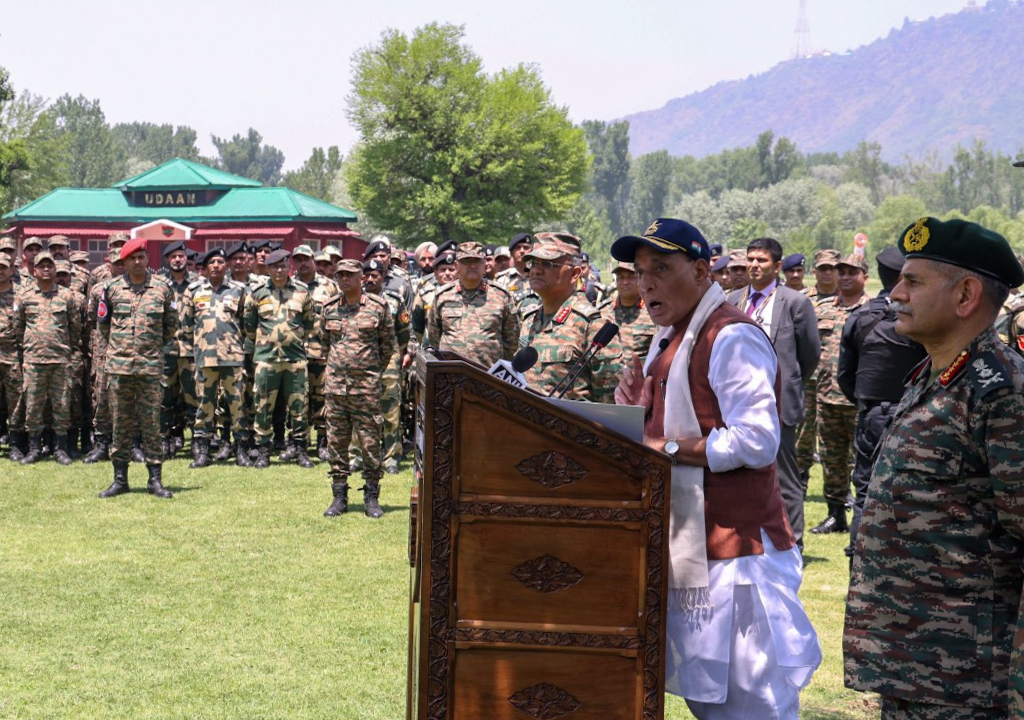Amid ongoing tensions with Islamabad, Defence Minister Rajnath Singh on Thursday raised serious concerns about the safety of Pakistan nuclear weapons, calling for international oversight. Speaking during his visit to Srinagar, Singh said Pakistan has acted irresponsibly as a nuclear-armed nation and urged the International Atomic Energy Agency (IAEA) to supervise its nuclear arsenal.
His remarks come just days after Prime Minister Narendra Modi declared that India would no longer tolerate nuclear blackmail in the wake of the Pahalgam terror attack and Operation Sindoor, a retaliatory strike by India on Pakistan-based terror camps.
“Are Nuclear Weapons Safe With Pakistan?”
In a direct message from the heart of Jammu and Kashmir, Singh questioned Pakistan’s nuclear stewardship:
“The whole world has seen how irresponsibly Pakistan has threatened India. Today, from the land of Srinagar, I want to raise this question: Are nuclear weapons safe in the hands of such a rogue and irresponsible nation?”
He further added:
“I believe Pakistan’s nuclear arsenal should be brought under international supervision by the IAEA for global security.”
This is the first time India has officially advocated for external monitoring of Pakistan’s nuclear program, highlighting the severity of India’s strategic concerns.
Operation Sindoor: Triggering a Paradigm Shift
Singh’s comments come in the aftermath of Operation Sindoor, India’s swift military response to the April 22 terror attack in Pahalgam, which killed 26 civilians.
India launched 24 missile strikes in 25 minutes across nine terror hubs in Pakistan and Pakistan-Occupied Kashmir (PoK), killing over 100 militants.
This bold move prompted Pakistan to retaliate with drone and missile attacks, some of which targeted Indian military bases such as Adampur.
Pakistan’s Nuclear Blackmail: India Hits Back
Following Operation Sindoor, Prime Minister Modi gave a landmark speech, laying down India’s new security doctrine, which directly addressed the issue of Pakistan nuclear weapons.
Modi’s 3 Key Security Principles:
- Terror attacks will be met with decisive responses.
- India will not be intimidated by nuclear threats.
- There is no distinction between terror groups and the governments that shelter them.
Modi asserted:
“Terror and talks cannot happen together. Terror and trade cannot go hand in hand. India will respond on its own terms.”
Rajnath Singh’s Srinagar Visit: Security Review and Message of Resolve
During his Srinagar visit, Singh:
- Reviewed the combat readiness of the armed forces
- Visited the 15 Corps Headquarters
- Inspected debris from Pakistani shelling
- Interacted with soldiers who participated in Operation Sindoor
- Paid homage to fallen soldiers and civilian victims of the Pahalgam attack
Accompanied by Jammu & Kashmir Lieutenant Governor Manoj Sinha, Singh praised the soldiers’ valor and reiterated:
“We will go to any extent to eliminate terrorism. Pakistan must stop sheltering terrorists.”
Why the Concern Over Pakistan Nuclear Weapons Now?
India’s demand for international supervision stems from:
- Repeated nuclear threats from Pakistani leadership during moments of crisis
- Fear of nuclear assets falling into the hands of rogue elements or terror groups
- Pakistan’s internal instability, especially within its army and intelligence agencies
- History of nuclear proliferation links to North Korea and Iran
Analysts warn that opaque command structures and radicalization within Pakistan’s security ecosystem make its nuclear program a global concern.
International Reactions Expected
While official responses from the IAEA and United Nations are awaited, Singh’s comments are likely to:
- Spark debates in global strategic circles
- Reignite pressure on Pakistan’s nuclear transparency
- Compel Western allies to review their non-proliferation posture toward Islamabad
This also strengthens India’s position as a responsible nuclear power, committed to non-proliferation and strategic restraint, in contrast to Pakistan’s behavior.
🔗 Also Read: Indian Fighter Jets Bomb Pakistan Air Bases »
Adampur Airbase: Ground Zero for Pakistan’s Attempted Retaliation
Earlier this week, PM Modi visited the Adampur Air Force Base in Punjab, one of the targets in Pakistan’s retaliatory strike post-Operation Sindoor. Pakistan had falsely claimed that its hypersonic missile destroyed India’s S-400 defence system, a claim dismissed by Indian officials.
Modi, speaking from the airbase, stated:
“Operation Sindoor is the new normal. India’s intent is clear—another attack will be met with overwhelming response.”
Ceasefire Breakdown and Escalation Risks
Despite a brief ceasefire agreed to under US mediation, Pakistan violated the agreement within hours, according to Indian sources. However, the border has remained calm since the firm Indian military response.
Singh warned that while India values peace, deterrence is the best diplomacy when it comes to terror-exporting nations.
Conclusion
Rajnath Singh’s call for international supervision of Pakistan nuclear weapons signals a new phase in India’s strategic messaging. By openly questioning the safety of Pakistan’s nuclear arsenal, India is internationalizing a long-suspected global concern.
This is not merely about India-Pakistan ties anymore—it’s about global nuclear security. As Operation Sindoor redefines India’s response to terrorism, Pakistan’s nuclear policy is now under the international scanner. India has made its position clear: nuclear threats won’t work, and accountability is long overdue.

